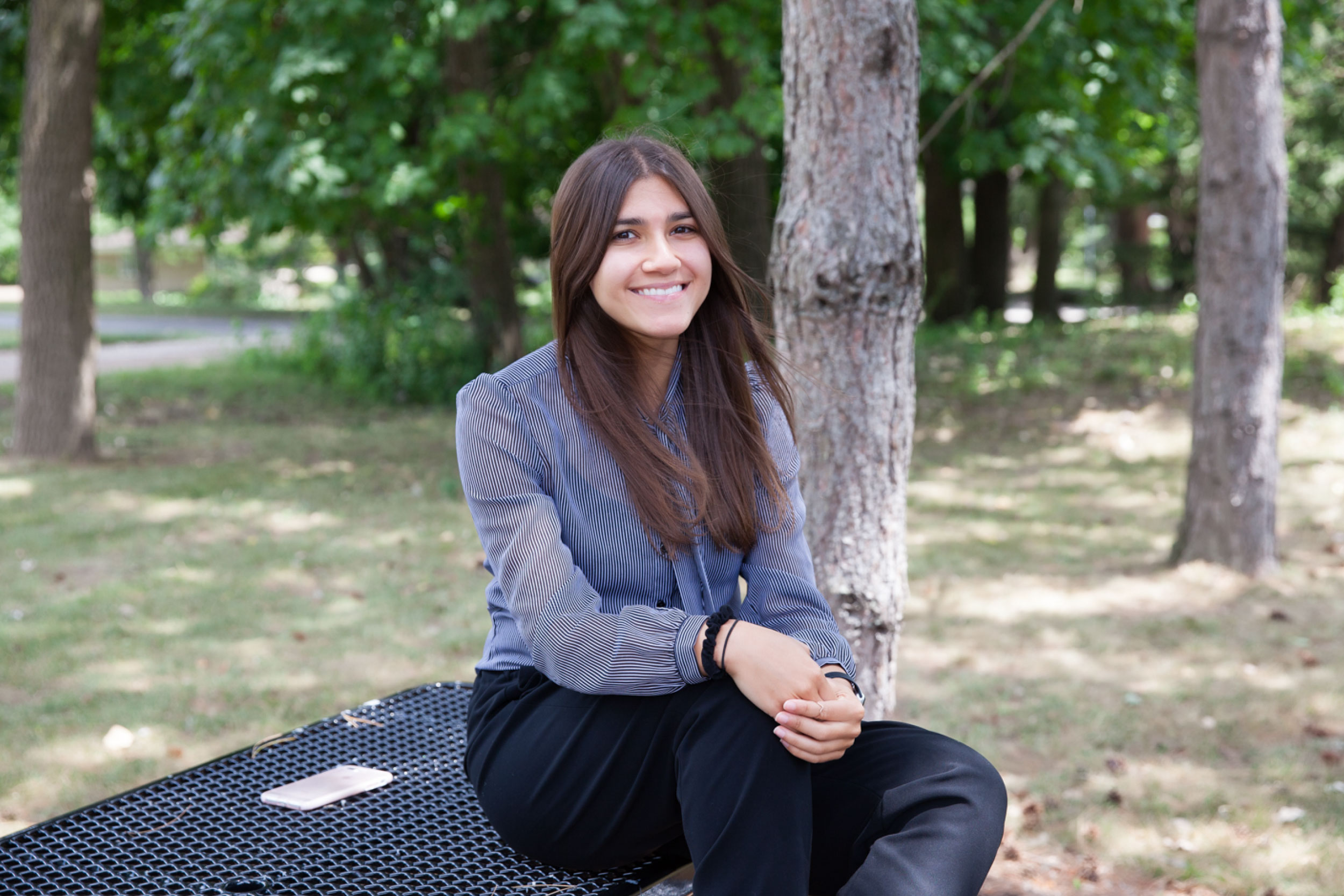Like many college students, summer break crossed my mind as I trudged through the snowy sidewalks of Ann Arbor last winter. In the depths of December, I started to come up with goals for my summer plans come April. I wanted professional experience, I wanted to be entertained, and I wanted to learn.
I spent the summer after freshman year living and working in downtown Detroit through the Semester in Detroit program at University of Michigan. My summer in the city gave me a taste of urban life. Detroit, in all its uniqueness, was a really great place to learn. It was close to home, but unfamiliar enough to challenge me. I was humbled by what I learned about social justice, meeting community needs and grocery shopping for myself.
By the end of my sophomore year, I had reflected on my previous summer and concluded that my personal and intellectual growth had been a result of my immersion in Detroit, an effect of its distinction from home and the challenges I faced there. I had ventured away from home, and I felt I was better off for it.
Meanwhile, I took a public health class, declared an organizational studies major and spent my second year of college living with friends from across the country. As my interest in the non-profit sector developed, so did my desire to venture even farther from my hometown of Bloomfield Hills. I figured large-scale organizations in places like New York and Washington were best-suited to meet my goals. A big job in the big city seemed like the antidote to boredom and a natural step toward success.
In Detroit, I had learned how to enter a community with humility and a willingness to learn. Next, I wanted to take those lessons somewhere I could make a difference.
The benefits of discovery: close to home

So, to no surprise, I felt conflicted when I ultimately decided to stay home for the summer as the Jeanette and Oscar Cooke Jewish Occupational Program (JOIN) intern at the Jewish Federation of Metropolitan Detroit.
Federation was a mile away from my house and a far cry from the high-speed, sprawling city corporation I’d envisioned myself in this summer. I was worried that I’d have less to learn inside my own, familiar Jewish community. I was fairly certain that my job would be easy, or at least straightforward. After all, I was born and raised in metro Detroit. I’d gone to preschool at my synagogue, nine years at Hillel Day School, spent a few summers at Tamarack Camps, been in a BBYO chapter, Jewish Fund Teen Board, services at Michigan Hillel, and so on. Most recently, I was in Israel on Birthright.
An internship at Jewish Federation seemed predictable. It seemed way too close to home.
Nonetheless, there was something that pulled me toward applying to JOIN. For all my doubts about staying in metro Detroit, an ache in my chest (and my parents) encouraged me to stay home.
Twenty Jewish college students from the area applied and were selected for JOIN. Each of us was interviewed and placed at a different agency where we work Monday through Thursday. On Fridays, we gather to reflect, tour agencies and meet community leaders. And so, despite my skepticism, I accepted an internship at Federation. I didn’t realize it at the time, but I missed home. This summer has been, in many ways, a homecoming.
My first week of work was surprising. I realized by my second day in the office that, despite my prior confidence, I really had no idea what Federation even did.
I was overwhelmed and humbled by the wealth of knowledge I accumulated that first week. I grew up learning about tzedakah, but I’d never thought about how raising money translated into community change. I sat in a Women’s Philanthropy meeting and heard a new language: words like endowment, campaign and allocation gained new meaning. There were networks of relationships and ecosystems of generosity that had never crossed my mind. I’d been living in this community my entire life, and I had finally stepped into its command center.
I started to recognize the way my thoughts churned as I sat in meetings, the way my notebook filled with messy, half-baked ideas. I had felt like this in Detroit, too: a sense of bewilderment, like I’d stepped into something much larger than myself. My job, it turns out, was not overly comfortable. Instead, even well within my own community, I was stretched in ways I hadn’t anticipated.
My communication skills were put to the test on the phone at our summer telethon. I had to practice, as the youngest person in a meeting, finding courage to join in on the conversation. At community events, I put a smile on my face and introduced myself to esteemed professionals, despite my nerves. I grew frustrated over my mistakes: it wasn’t as easy as I expected to manage a busy calendar, communicate effectively and problem solve creatively. Simply being from here wasn’t going to cut it: I had to cultivate a new confidence in myself in order to ask questions, speak up and ultimately step up when and where I was needed.
All the while, I was experiencing firsthand just a sliver of the work that goes into taking care of the Jewish community, in Detroit and around the world. I knew from previous experience that non-profit professionals often wear many hats. It’s not unlikely to be in a meeting with an important executive director one hour and settings tables for an event the next. At Federation, for example, preparation for the summer telethon ranged from intense campaign strategy meetings to heated debates over which kosher caterer to hire for dinner. My supervisor, Jessica Goodwin, often stresses to me this very fact: the multifaceted, do-it-all spirit of the Jewish communal professional.
I hadn’t realized until I was thrown back into a Jewish value-based setting that I had been missing this spirit. It’s not really about the strategic meetings or the dinner menu. It’s not only about raising money or spending it. When your job is to fundraise, it’s important to ask yourself for what. When your career, or summer internship for that matter, is to build a vibrant Jewish future, it’s essential to ask yourself why. Why do we do this? Why does it matter?
When I asked myself these questions, I began to notice how separated I became in college from my Jewish self. I’ve spent a lot of time questioning my identity and trying to align my aspirations toward somehow improving the world. But despite my soul searching, I’d failed to recognize the fundamental importance of my Jewish education, my parents’ efforts to bring Judaism into our home, and the Jewish community that gives and gives without missing a beat.
“You are not obligated to complete the work, but neither are you free to desist from it.” – Pirkei Avot
This summer has been an exercise in answering these questions. In finding out why we ask, and why we give. In understanding what we are working for. Along the way, I’ve started to peel back layers I’ve built up around my Jewish identity. My second week of work, I staffed a program at Hillel Day School. I’d hardly set foot in the building since I graduated six years ago, and the entire school has been recently renovated. As I looked around, I wandered off for a moment through the doors of the chapel, which, amid all the changes, looked exactly how I’d last seen it.
And then I began to remember. I remember myself in eighth grade, sitting at morning minyan in the purple chapel. I remember why I care in the first place. When I say I care about social justice, what I mean is that I want to repair the world, Tikkun Olam. I remember why I’m willing to bare my soul to defend my faith, and why Hebrew words sound like music to me. When I visited Jerusalem three months ago, I could not explain why I was crying. I hadn’t realized I was missing home.
And much to my surprise . . .
Home has surprises at every turn: in the language of Jewish communal work that I’m decoding, in the people I’ve met whose paths have taken them around the world and back here. I’ve seen different facets of our community come to life, be it at a barbecue at JARC, Shabbat at Tamarack Camps or an afternoon at Fleishman Senior Residence. And so when I ask for dollars, that’s why. When I say I’m from here, what I mean to say is thank you. When I say I’ve seen the command center, what I mean is that is I’ve seen the heart.
Every asset I can bring to a new environment, from planning a fundraiser to gaining confidence to ask a question, has been strengthened by my internship at Federation. What I was missing last year, as I craved to be somewhere different, was an understanding of why, in a complicated, enormous world, I am so proud to be from here, and so proud to be Jewish.
Sure, I could have walked away from many jobs with the breadth of professional experience I gained through JOIN. But what I would have missed if I had gone somewhere else, though, was a better understanding and appreciation of where I come from. As it turns out, I’m also starting to understand and appreciate myself. It has been the greatest privilege to give back just a tiny bit to my mighty little corner of the world. I am thankful for these skills, and I will carry them with me into new cities and communities.
What a blessing it’s been to be “too close” to home.




